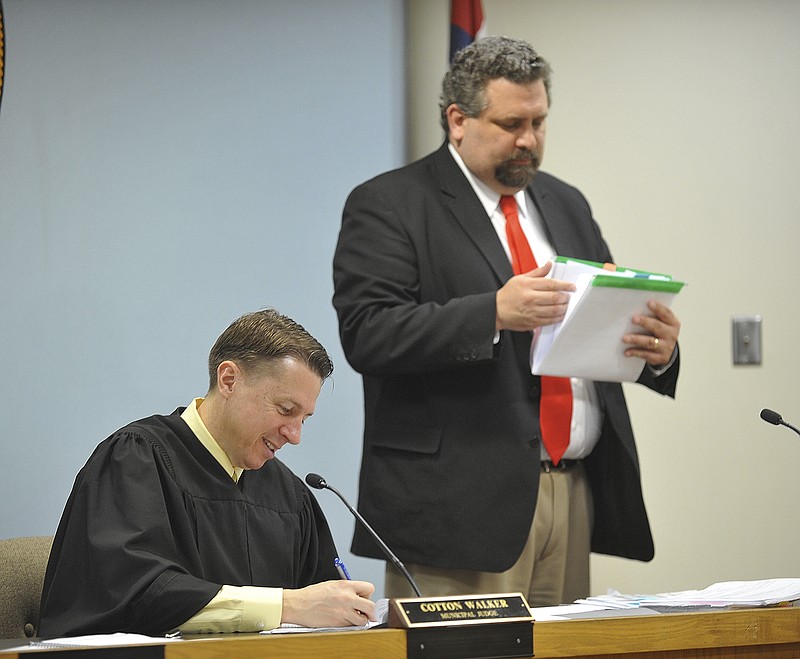It's been four years since Cotton Walker and Brian Stumpe took office in the Jefferson City Municipal Court and both are looking forward to potential improvements to municipal court in their next term.
Walker and Stumpe are two of many unopposed candidates who will appear on the April 7 ballot. While there is a six-way race for Jefferson City mayor, all five council seats are unopposed, as are the municipal judge and prosecutor.
Walker, who became municipal judge in 2011, said he wants to continue in office because he enjoys serving the community as judge and believes he has a fair sense of justice. He said the best part of serving has been dealing with people from many different backgrounds and seeing them be treated with respect while they get their day in court.
"They feel like they've gotten justice, they've been heard," Walker said.
Walker said the worst part is when he feels like someone has left municipal court not feeling as if they were treated fairly or with respect.
"That's the hardest part," Walker said.
Stumpe, who became municipal prosecutor in 2011, said the best part of serving so far has been the success stories, recalling one instance when a young man who Stumpe had spoken with several times and had gone through municipal court, showed up to invite Stumpe to his college graduation.
"I really felt honored that of all people to invite, he asked me to come to that," Stumpe said. "There's people that really have turned their lives around. ... Those people really make a big impact."
Stumpe said there aren't many bad parts to serving as prosecutor, but a discouraging aspect is seeing the same people come through court over and over again without learning from past mistakes.
"They just don't get it," Stumpe said. "It's hard when you see you can't get to somebody."
Walker said many of the issues the state legislature is trying to address with municipal courts right now are not problems for Jefferson City. Municipal court generates less than 3 percent of the city's revenue and both Walker and Stumpe have focused on community service over fines.
Walker said the court already has a written application for payment extensions that take into account a defendant's ability to pay.
"Just taking that time and effort is something we do particularly well," Walker said.
Nearly two years ago, the municipal court switched from primarily holding night court to day court, initially out of budget concerns as night court required more overtime for city employees.
Walker and Stumpe both said the switch has gone well, but the disruption to those doing business at City Hall has been a consideration in discussions about moving municipal court's location.
Stumpe said Jefferson City's municipal court handles roughly 12,000 cases annually, noting on this past Wednesday, that about 400 people had already come through court before lunch.
"That disrupts the other business at City Hall, so I think there is a benefit to move it," Stumpe said.
As officials with the city's Parks, Recreation and Forestry Department work toward a new multipurpose facility with Lincoln University on Lafayette Street, some have discussed the possibility of moving municipal court into the current parks offices in the city annex on the corner of Monroe and East Miller streets. However, the idea is dependent on parks moving its administrative offices to the new multipurpose facility, which has not been officially decided or announced.
Walker has said the courtroom, which is the council chambers at City Hall, does not necessarily need more space, but could be configured better for their purposes. What does need more space, he said, is the area for court clerks, which is cramped with the amount of records that need to be stored.
Another consideration for a new court space, is the potential for municipal court to expand days. Currently, the court operates on Wednesdays, but there may be a need to add another half-day or full day per month in the future.
Walker said the switch to days has resulted in better security, as there are more people in the facility during the day, as well as an overall improvement in court decorum.
"It's been a lot better," Walker said.
For Stumpe, the switch did come with one negative aspect - shorter office hours. When court was held in the evenings, Stumpe held office hours throughout the day on Wednesdays to meet with defendants or attorneys. Now, he has about one hour of time for those meetings, from 11 a.m. to noon each Wednesday.
"I think it affects me the most," Stumpe said of the switch.
Moving forward, Stumpe said he sees more work to be done and programs to develop to help address issues and ensure justice is served.
He noted that community service has increased in the past four years, as both he and Walker have tried to incorporate more of that in sentencing. And while that doesn't generate revenue, it does make a real difference, he said, for the better.
"We're really trying to impact the society," Stumpe said. "We're tough, but we're fair."

